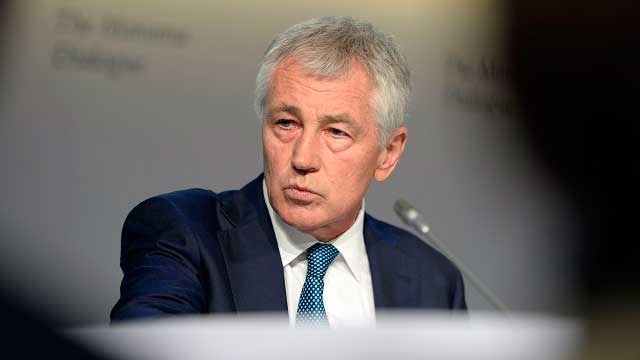SUMMARY
This is AI generated summarization, which may have errors. For context, always refer to the full article.

SINGAPORE – (UPDATED) Thailand’s coup leaders faced fresh international condemnation Saturday, May 31, when US Defense Secretary Chuck Hagel demanded immediate elections and the release of detainees held by a junta which says there will be no polls for 15 months.
Speaking at an Asian security conference in Singapore, the Pentagon chief urged Thailand’s military to free scores of people detained under martial law since generals seized power from the civilian government on May 22.
His strong comments, made at the annual Shangri-La Dialogue, came as Thai authorities faced the threat of weekend protests in central Bangkok against the army power grab.
Hagel called on the junta to end its curbs on “free expression” – which include banning political gatherings of more than five people and sweeping media controls – and for the army to “immediately restore power to the people of Thailand” through elections.
Condemning the kingdom’s “retreat from democracy” Hagel said the US had suspended its long-standing military ties with Thailand.
Australia’s foreign minister on Saturday also said Canberra had reduced its “engagement” with the Thai military.
Junta chief Prayut Chan-O-Cha late Friday, May 30, gave a rough timetable for a return to democracy, offering polls once a reconciliation drive across the bitterly split nation and a year-long reform period are complete.
“Stage three is a general election under an absolute democratic system that is acceptable to all sides,” he said in his first televised address to the nation.
But he warned his roadmap will probably fail “if there are still protests or people do not co-operate.”
Since taking power, authorities have overridden the constitution, curtailed civil liberties under martial law and imposed a nightly curfew.
Fears for detainees
After leading Thailand’s 19th actual or attempted putsch in modern history, Prayut ordered the detention of scores of political figures, academics and activists.
Some of the detainees have been freed after signing agreements to renounce political activities, among them several high-profile figures from the ‘Red Shirt’ movement – which supports the ousted government of Yingluck Shinawatra.
But rights groups have warned detentions violate basic civil liberties and that military courts wield unchecked power.
Yingluck’s billionaire brother Thaksin, a former premier who lives in self-exile, sits at the heart of Thailand’s festering eight-year crisis.
Anti-Thaksin demonstrators staged a months-long protest against the government.
Twenty-eight people died and hundreds of others were wounded in political violence linked to those rallies, losses Prayut said left him no choice but to intervene.
Thailand’s rupture broadly pits the Bangkok-based establishment – which draws on wide military support – against the rural poor of the north and northeast, whose votes have propelled Thaksin-led or aligned parties to power in every election since 2001.
Anti-coup demonstrators say the putsch is an assault on democracy and a thinly-veiled attempt to overturn the electoral dominance of the Shinawatras and their rural base.
Some experts believe the military move is part of a wider power play spurred by fears over who will be in charge of the nation once the more than six-decade reign of the nation’s revered but ailing king ends.
Protesters have gathered in small but vociferous numbers every day since the army took power.
Rallies were expected Saturday, while several major shopping malls in a downtown commercial district said they would close on Sunday in anticipation of further demonstrations.
General Prayut has warned he will not brook protest, but so far soldiers and police have taken a relatively light-touch to enforcing martial law.
“Thai people, like me, have probably not been happy for nine years, but since May 22, there is happiness,” the general said Friday, as he also laid out broad economic plans for the country.
He said a curfew could be relaxed in certain areas amid fears that it is having a further negative effect on the key tourism industry.
Thailand’s economy shrank 0.6% year-on-year in January-March due to falling consumer confidence and a slump in tourism. – Rappler.com
Add a comment
How does this make you feel?
There are no comments yet. Add your comment to start the conversation.